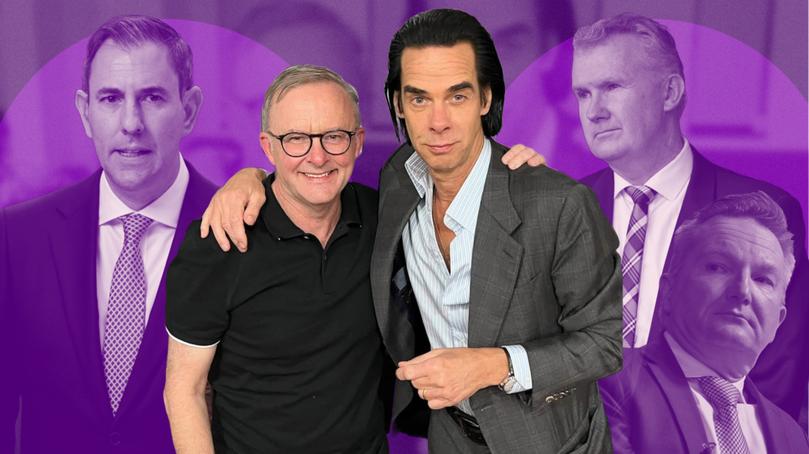ANDREW CARSWELL: Can Anthony Albanese think about supporting Aussie households as much as he does our musos
ANDREW CARSWELL: You can’t begrudge Albo for finding solace from politics in music, but in moments between Nick Cave gigs, it’d be nice if he could think about fixing our economic woes.

Anthony Albanese must spend a lot of time going to gigs and listening to Nick Cave.
We partly know this because of his cringy tendency to litter social media with such cultural outings. Front row, black t-shirt, a shaka symbol deployed with gusto, heart throbbing along with the great (inner city) unwashed.
And look, you can’t begrudge a grown man, a serious man, getting in touch with his anarchic youth. Letting off steam. Trying to stay cool. Finding a suitable solace from the slings and arrows of politics.
Sign up to The Nightly's newsletters.
Get the first look at the digital newspaper, curated daily stories and breaking headlines delivered to your inbox.
By continuing you agree to our Terms and Privacy Policy.But we also know this from his own words. And it’s rather instructive. Not about what he’s listening to, but what he’s choosing to ignore.
In giving some quotes to a weekend feature on Cave, Albanese chose these words.
“When you’re at a gig — particularly one as captivating as a Nick Cave gig — you’re not thinking about productivity or growth.”
If Albanese ever thinks about productivity or growth, it isn’t obvious. Maybe now we have an explanation. The distinctive baritone, with his dark poetic lyrics, must be on a constant loop inside his head. Red Right Hand on repeat. Long Dark Night, every night.
Ironically, in attempting to provide an innocuous example of the things that energise him, versus the things that allegedly preoccupy him, the Prime Minister chose to itemise two failures of his government.
A failure to address lagging productivity, and a failure to keep economic growth at the very least in line with our global peers.
Rather than thinking about boosting productivity, in the moments between Nick Cave gigs, the Albanese government seems determined to undermine it, despite the broad ramifications for the economy and household budgets.
Because it doesn’t believe in productivity. It bucks against its economic ideology. It runs counter to its social engineering.
It resorts to using the term as a buzzword, cast into its economic narrative to appease economists and the Reserve Bank. Used to justify policies that actually do the opposite.
The government’s Back to the Future industrial relations changes are a case in point. Employment Minister-turned-Border czar Tony Burke was adamant that his rewriting of workplace law would boost productivity. He told all and sundry. The business community lol’d. It is still a running joke in the hallways of corporate Australia. Give Burke some credit for the chutzpah.
It is hard to boost productivity when you reduce flexibility, put casual employment on the endangered list, artificially inflate wages and force businesses to pay the same wages to employees for doing the same jobs despite their experience, qualifications or age. Who knew socialist workplace policies were such a boon for productivity!
Despite the government’s assurances, the unions are certainly clear-eyed about the changes.
At the weekend, unions forced BHP against its will to start negotiating the first collective agreement in the Pilbara in a decade. Against the will of employees who have long enjoyed high wages and generous entitlements in a union-free utopia.
They are demanding annual pay increases of five per cent. Substantial, but hardly surprising.
But then they give the game away. Future pay rises, they say, must not be tethered to increases in productivity.
More reward for no extra effort.
The government also says its Future Made in Australia policy increases productivity, but there is a distinct possibility it may have confused its “p” words. It looks awfully like protectionism.
There has been a bevy of experts confirming the policy will actually hurt productivity, including Danielle Wood, the Albanese-appointed head of the Productivity Commission (the hint is in the name).
In what universe does giving out free money boost productivity?
What about energy policy? Surely a safe bet, given Minister Chris Bowen has repeatedly claimed his clean energy revolution will boost productivity.
Yeah, not so much. Productivity is about getting more outputs for less input, and given the government’s stubborn all-electric policy frolic has put upward pressure on energy prices (see: input), productivity gets zapped in the process.
Even with the care economy, in the midst of a monumental government spendathon, the propensity of the Albanese Government to stamp “pro-productivity” on its reforms is laughable.
Treasurer Jim Chalmers has routinely described his record spending on aged care and the NDIS as investments that will drive productivity because this sector is a growing part of the economy.
Cue another intervention from the helpful Productivity Commission, which noted the difficulty of lifting productivity in labour-intensive industries.
“As those sectors expand as a share of the economy, as they inevitably will, that will drive down productivity overall, and you have got to work harder elsewhere,’’ Ms Wood said.
Say what you will about Nick Cave’s music. It is an acquired taste, those brooding melodies laced with wisdom and defiance.
But as fanboy Albanese knows, a quick perusal of Cave’s extensive discography makes one thing clear.
The bloke knows a good, hard day’s work.
Maybe productivity is exactly what one should be thinking when they see Nick Cave on stage.
